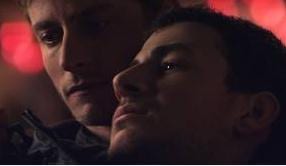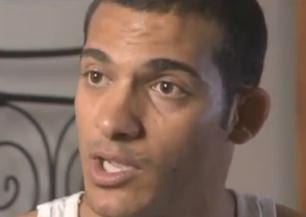
In Out in the Dark, a Palestinian university student named Nimr falls in love with an Israeli Jew named Roy.
In The Invisible Men, a documentary at this month’s Toronto Jewish Film Festival, a gay Arab who lives illegally in Tel Aviv speaks bluntly about why he has to flee the Middle East: “The Palestinians won’t accept us because we’re gay, and the Israelis won’t accept us because we’re Palestinian.”
The Invisible Men is one of two films at this year’s festival to tackle an emerging issue, that of gay Arabs who discover that they’re unwelcome in either Israel or Palestine and, as a result, face deadly reprisal. The other, Out in the Dark, is a thriller that’s currently outperforming Argo in Israeli cinemas. Both are moving, balanced portraits of how ordinary people in the Middle East find their personal lives ripped apart by political and social conflict.
“The films are a wonderful way in for audiences to look at the situation from a human point of view,” says Allen Braude, a gay man who serves on the festival’s programming committee.
The Invisible Men tackles the emerging issue of gay Arabs who discover that they’re unwelcome in both Israel and Palestine.
In Out in the Dark, a drama inspired by real events, a Palestinian university student named Nimr falls in love with an Israeli Jew named Roy. In Ramallah, Nimr has to hide his sexuality from his family, while in Tel Aviv he must constantly duck authorities. That’s because, despite the fact that Israel promotes itself as a safe haven for gays, it continues to expel gay Palestinians on security grounds – even those who are threatened by their conservative, traditional families.
Yariv Mozer’s The Invisible Men covers the same ground as Out in the Dark, minus the Romeo and Juliet-style love story. It’s the real-life tale of Louie, a quiet gay Palestinian who manages to live illegally in Tel Aviv for 10 years until his situation becomes unbearable. In both films, the central Palestinian characters eventually have to make an agonizing choice: whether to cling to the Middle East or flee to a new home in a more welcoming country.
Lihu Roter, who produced Out in the Dark, says the movie came about after his friend, writer-director Michael Mayer, heard about a gay Palestinian who was forced by political circumstances to leave the region. “We started hearing a lot of stories about this going on,” Roter says, adding that he finds the issue to be “amazing, interesting and sexy.”
Yet, despite making a suspenseful film with a strong social message and a cute cast, Roter is pessimistic that Out in the Dark will improve the lives of gay Palestinians. “We’re bringing the subject up, but I’m not sure it will make a real change in the situation,” he says. “Israel is in a really gloomy place, and everything is getting worse on every topic.”
For his part, Braude hopes both movies will spark a debate and, possibly, some local activism. “I’ve never seen actions in Toronto around this,” he says. “Maybe more action will be taken by the outside community to help these men.”
In Out in the Dark, a Palestinian university student named Nimr falls in love with an Israeli Jew named Roy.
One of the gay Palestinians featured in The Invisible Men says the Middle East would be a better place if gay men were in charge. Says Braude, a Canadian of Israeli descent, “I would love to believe that about everything, everywhere.” He’s not convinced that’s the case, but adds, “As the [gay Arab and Jewish] communities connect and become closer, it bodes well for a solution in the long term.”
Two other options at the Toronto Jewish Film Festival
There are two other gay-ish films being screened at the Toronto Jewish Film Festival. The first, Koch, is the hot new documentary about New York City’s complicated mayor Ed Koch, who was loathed by many in the gay community for reacting slowly to the AIDS crisis. The movie, by Neil Barsky, deals with a debate that Koch took to his grave: the question of whether he was a closet case.
The other gay-ish film is Re-emerging: The Jews of Nigeria, produced by an emerging gay Canadian filmmaker named Jeff Lieberman, who now lives in New York City. Lieberman travelled to Africa to tell the tale of Nigeria’s Igbo Jews. “I found the stories that people shared of declaring their Jewish identity to parents, friends, spouses and neighbours not all that different from coming out,” Lieberman says.
Toronto Jewish Film Festival
Thurs, April 11–Sun, April 21
Various locations
<iframe width=”420″ height=”236″ src=”//www.youtube.com/embed/s9lvumrzkgw” frameborder=”0″ allowfullscreen></iframe>
<iframe width=”420″ height=”236″ src=”//www.youtube.com/embed/A0p-Jj7Djc0″ frameborder=”0″ allowfullscreen></iframe>

 Why you can trust Xtra
Why you can trust Xtra


